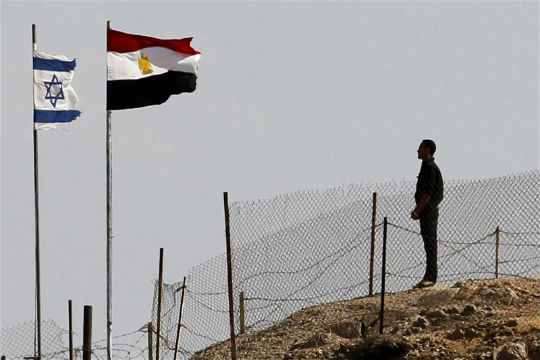Latest NEWS
- Aswat Masriya, the last word
- Roundup of Egypt's press headlines on March 15, 2017
- Roundup of Egypt's press headlines on March 14, 2017
- Former Egyptian President Hosni Mubarak to be released: lawyer
- Roundup of Egypt's press headlines on March 13, 2017
- Egypt's capital set to grow by half a million in 2017
- Egypt's wheat reserves to double with start of harvest -supply min
- Roundup of Egypt's press headlines on March 12, 2017
Egypt rejects UN statements on killing of Sudanese nationals in illegal immigration attempts

Borders between Egypt and Israel at Taba - Mohamed Abdel Ghani/Reuters
By Hend Kortam
CAIRO, Nov. 24 (Aswat Masriya) - Egypt's foreign ministry said on Tuesday that it rejects statements by the UN secretary-general on the recent killings of Sudanese nationals by Egyptian border guards.
Stephane Dujarric, spokesman of Secretary-General Ban Ki-moon said in a press briefing on Monday that Ban "remains deeply troubled" by reports on the killing of five Sudanese nationals near the Egyptian-Israeli border.
On Monday, the Egyptian armed forces said border guards killed and injured the Sudanese nationals who were attempting to cross into Israel, after firing warning shots. Five other Sudanese nationals were arrested.
The killings on Monday came on the heels of a similar incident on Nov. 15, in which at least 15 Sudanese nationals were shot dead, also near the Egypt-Israeli border. They are believed to have been killed while attempting to cross over to Israel but the incident was never acknowledged in an official statement.
The killings on Monday prompted the Sudanese foreign minister to address the former incident before parliament, confirming that 16, not 15 people were killed, according to Reuters.
Ban's spokesman said he "urged the Egyptian authorities to launch a full investigation," describing the incidents as "tragic events".
In response, Egypt's Foreign Ministry Spokesman Ahmed Abu Zeid said in an emailed statement that the continued approach of "jumping to issue statements and criticism without relying on accurate information or viewing statements issued by the Egyptian government" was "regrettable".
Abu Zeid called on Ban and his aides to read the armed forces' statement which clarifies "beyond reasonable doubt" that the Egyptian border guards were dealing with "illegal infiltrators."
He added that the statement says border guards fired warning shots which were not heeded and that the migrants "initiated firing at security forces," injuring a soldier.
In a later statement released today by the Egyptian foreign ministry, Abu Zeid said Foreign Minister Sameh Shukri and his Sudanese counterpart Ibrahim al-Ghandour discussed bi-lateral ties in a phone call.
They asserted the "strength" of ties between the two states, stressing the importance of being vigilant against "attempts" to create rifts between Egypt and Sudan.
They also affirmed the importance of each party continuing to provide the "largest amount of care" for citizens of the other country.
This is not the first time Sudanese nationals are targeted by Egyptian security forces on Egypt's borders.
In a report dating back to 2008, Human Rights Watch (HRW) said Egypt should end the "shoot to stop" policy to prevent migrants from crossing. The watchdog said Egypt should "halt the use of lethal force against border crossers and all deportations of persons to countries where they risk persecution or ill-treatment."
Egypt's eastern border, which it shares with Israel, is a troubled area with a recent history of human trafficking of victims from Eritrea, as well as Sudan and Ethiopia.
The Sinai desert had for years been used as a route to Israel by thousands of migrants from different parts of Africa, including Sudan and Eritrea, who pay smugglers in the hope of greener pastures beyond Egypt's borders.
But since 2010, according to HRW, many have ended up in North Sinai against their will.
An HRW report issued in February 2014 said, "until 2010, they passed through Sinai voluntarily and generally without problems and crossed into Israel. But over the past three years, Sinai has increasingly represented a dead-end comprised of captivity, cruelty, torture, and death."
At that time, smugglers began to turn on clients for ransom, torturing victims and making their relatives pay through extortion. But even after relatives paid the smugglers, the victims were often sold to other traffickers instead of being released.
The report which was based on dozens of interviews with victims and two traffickers said that Sudanese and Egyptian security forces "colluded" with the traffickers.
Yet, the long journey which takes the migrants, many seeking asylum from conflict-ridden countries, to Egypt's Sinai and finally to Israel, often ends badly.
The Israeli state does not welcome migrants and has taken several measures to stop their influx.
In January 2012, Israel passed a law that allows the "automatic detention" of anyone who enters the country without permission, including asylum seekers, Amnesty International criticized in a statement after the Israeli parliament passed the law.
The watchdog said the law was aimed "at those entering via the Egyptian border."
Then-deputy director for MENA at Amnesty Ann Harrison, said "Israel has the right to protect its borders, but it does not have the right to abandon its international human rights obligations to asylum-seekers, refugees and migrants, or to criminalize them as 'infiltrators', which only fuels xenophobia and discrimination."
More recently, in December 2013, Israel completed the construction of a barrier along the Egyptian-Israeli border to block migrants' access to Israel through Egypt.










